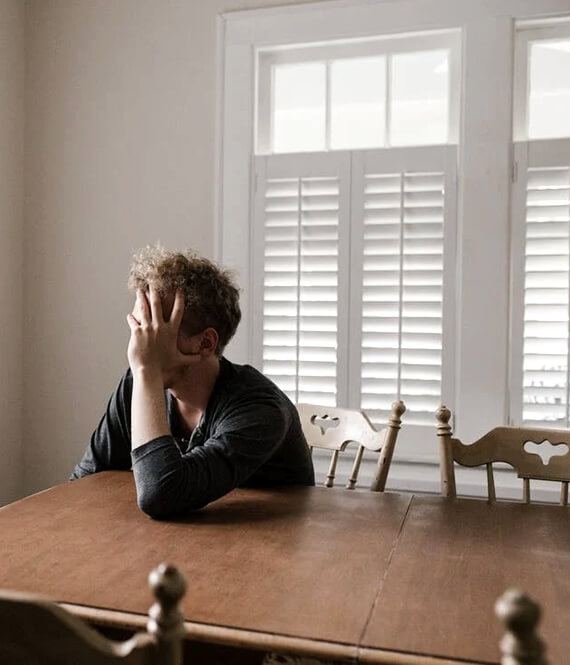
The Deceptive Nature of Anxiety: How Your Mind Plays Tricks on You
We recommend helpful products in our articles. Read our full disclosure here. The content on this website is not intended to be a substitute for professional advice, diagnosis, or treatment.
Anxiety is a complex emotion that often defies logic and reasoning.
It is a universal experience, yet it manifests differently in everyone.
At its core, anxiety is a protective mechanism, preparing the body for potential threats.
However, when anxiety becomes chronic, it can distort perceptions and create a reality filled with unwarranted fears and concerns.
In this article, we delve into the deceptive nature of anxiety and explore effective strategies for regaining control over your mental well-being.
Understanding the Deceptive Nature of Anxiety: How Your Mind Plays Tricks on You
Anxiety often whispers falsehoods in our minds, masquerading as intuition or factual reasoning.
These thoughts can create an overwhelmingly true narrative as they become more frequent.
This misrepresentation skews our perception, convincing us that danger is everywhere.
Recognizing that your anxiety is lying to you is a crucial first step toward countering its effects.
Many experience anxiety as a relentless voice that amplifies the severity of every situation.
It’s not just about nervousness or stress; anxiety taints your thoughts with catastrophic predictions that often never come to pass.
The brain gets caught in a loop, interpreting every physical symptom or unusual event as a sign of impending doom.

Understanding these patterns is essential for distinguishing between anxiety-induced deception and reality.
This mischievous aspect of anxiety can affect decision-making, forming a barrier to taking positive risks or embracing new opportunities.
It generates a risk-averse mentality by overstating the probability of failure or rejection.
However, by identifying and challenging these cognitive distortions, individuals can begin to reclaim the narrative their anxiety has attempted to author.
Often, the relentless nature of anxiety can lead to avoidance behaviors.
What starts as a protective mechanism can quickly become a debilitating force, hindering growth and the pursuit of happiness.
It’s important to note that the mind, in its attempt to evade discomfort, can develop a pattern of avoidance that reinforces the deceptive nature of anxiety.
Cognitive Distortions: How Anxiety Warps Your Thoughts
Cognitive distortions are twisted ways of thinking, often perpetuated by anxiety.
These thought patterns, such as catastrophizing or black-and-white thinking, are common among those struggling with anxiety.
They distort reality, fuel negative emotions, and might lead to unhealthy behaviors as a means of coping.

By identifying and challenging these distortions, we can correct our thought processes toward more balanced, rational thinking.
Catastrophizing, for example, involves expecting the worst-case scenario in any given situation, no matter how unlikely.
This thought distortion can paralyze individuals with fear over events that may never come to pass.
Another distortion, personalization, causes people to blame themselves for events outside their control, further fueling feelings of anxiety and inadequacy.
The mind’s ability to overgeneralize based on limited experience is yet another way anxiety lies to us.
If one event goes wrong, anxiety will make you believe that all subsequent events will follow the same pattern.
This often results in feelings of helplessness and hopelessness, both unwarranted and unproductive.
Practicing mindfulness and critical thinking is critical to overcome these cognitive distortions.
Therapy, particularly cognitive-behavioral therapy (CBT), can provide effective tools to correct these anomalies in thought patterns.
Recognizing and disrupting these negative thought cycles is integral to managing anxiety and improving mental health.
Breaking the Anxiety Cycle: Techniques to Ground Your Mind
Breaking the vicious cycle of anxiety requires dedication and consistent practice of grounding techniques.
These methods help to steer the mind away from spiraling thoughts and focus on the present moment.
For instance, deep breathing exercises serve as a powerful tool to calm the nervous system and bring one’s attention back to the body, mitigating the physiological symptoms of anxiety.
Another effective strategy is engaging the senses to ground oneself in the here and now.
This can include touching a piece of cloth, tasting a flavorful food, or concentrating on the sounds in the environment.
By focusing on these sensory experiences, the mind is distracted from anxious thoughts, offering immediate relief from the grip of anxiety.
Incorporating regular mindfulness meditation into your routine can also help break the pattern of incessant worrying.
Meditation encourages staying present and observing thoughts without judgment, training the mind to recognize but not engage with anxiety-provoking ideas.
Over time, this cultivates a more composed mindset that is less likely to succumb to anxiety’s deceptions.
By acknowledging the deceptive nature of anxiety and actively engaging in various grounding and therapeutic techniques, individuals can make significant strides in combating anxiety and reclaiming their mental health.
"We love to research problems, examine studies, analyze solutions, and share with you ideas that make life healthier. You can learn about us and our editorial standards here. Have suggestions or feedback to share? Send us a message!."













Leave a Comment